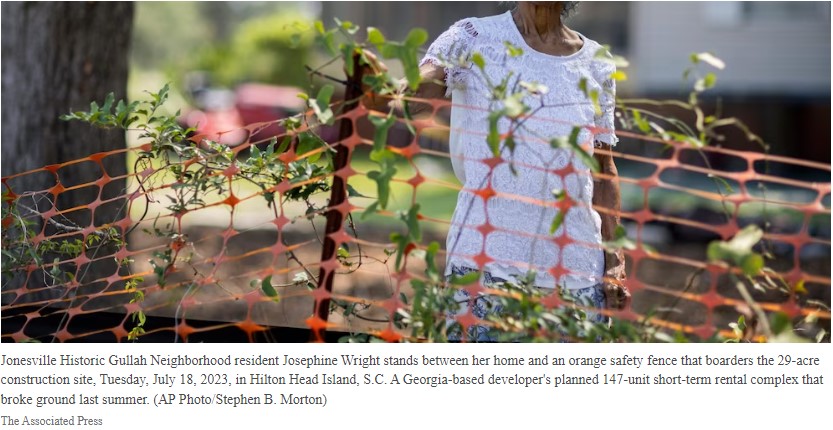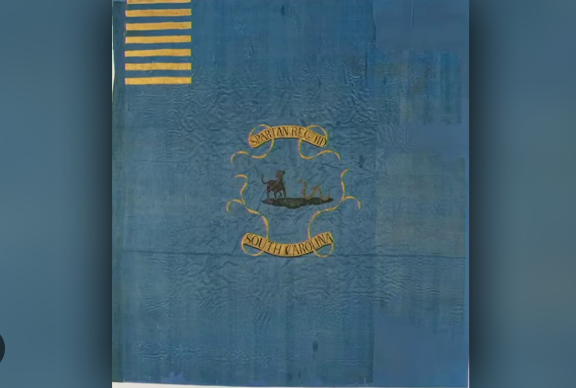SOUTH CAROLINA: Developers Have Black Families Struggling to Maintain Property, History
PHILLIPS COMMUNITY, S.C. — The Rev. Elijah Smalls Jr. once grew okra, butter beans and other vegetables in the neighborhood where his family has lived near the South Carolina coast since survivors of slavery bought patches of their plantation after the Civil War.
Then came half-a-million-dollar homes in a nearby subdivision, overwhelming the drainage system. Runoff meant for sewers now pools in the 80-year-old veteran’s backyard, making gardening impossible.
Smalls and his relatives in Phillips Community are the many Black families still living in historic settlement communities around Charleston. Like others all along the South Carolina coast, their land is being targeted by developers of vacation getaways and new homes.
And as real estate prices rise from Myrtle Beach to Hilton Head, Black property owners have found themselves embroiled in disputes with investors and their own relatives.
State reforms approved in 2017 provided what supporters described as “shark repellant” — a law that made it harder for developers to strike deals below market prices with distant heirs who had long since moved away.
But skyrocketing property taxes create a growing burden. Elders worry that their family legacies — established by formerly enslaved ancestors who acquired land despite entrenched racism across the defeated South — are slipping away.
“If we don’t take steps to protect them, we’re going to lose them parcel by parcel,” said Coastal Conservation League Executive Director Faith Rivers James.
Orange mesh fences the raw dirt of a new development that now encircles the ranch-style house where Josephine Wright has taken her stand. The 93-year-old woman is the matriarch of a family that has owned land on Hilton Head Island since Reconstruction.
“I’m being surrounded, really,” Wright said in the Brooklyn accent she picked up before returning to her late husband’s home 30 years ago in Jonesville Historic Gullah Neighborhood, where the 2020 Census estimated about 440 people still live.
They wanted tranquility as his Parkinson’s disease progressed. But gone is the lush greenery that once grew on 29 acres their relatives previously owned around Wright’s home. A Georgia-based developer, Bailey Point Investment, LLC, broke ground last summer on a 147-unit vacation rental complex there.
Managers of her family’s trust had failed to pay escalating tax bills. The land sold at a 2014 tax auction for just $35,000 — a fraction of its current worth.
Then the investment company sued Wright, who owns her one acre separately, alleging that a corner of her screened-in porch, a shed and a satellite dish encroach on the construction project. A lawyer for the company did not return a call from The Associated Press.
She suspects they want to run her off, but she’s not intimidated. NBA superstar Kyrie Irving and filmmaker Tyler Perry have lent their support. Town officials don’t intend to issue building permits until the case is closed. She says other residents have thanked her for holding out.
The first self-governed town of formerly enslaved people in the United States was on Hilton Head Island. Wright’s neighborhood gets its name from a Black Civil War veteran named Caesar Jones, who had escaped enslavement and purchased more than 100 acres, finding refuge in marshland dismissed by colonists as unsuitable.
It’s hardly undesirable today. Air conditioning made the land more appealing. New highways improved access to the coast, where newcomers have helped make South Carolina the 10th fastest-growing state during the past decade.
Those searching for land found easy targets in the Gullah Geechee community, owned by descendants of West Africans who were forced into slavery on rice, indigo and cotton plantations. They developed a unique culture on isolated islands, but their separation from the U.S. legal system left them vulnerable to exploitation.
Developers took advantage in many cases of what’s known as heirs’ property — land transferred from generation to generation without a will and shared equally by part-owners whose numbers grow with the family tree. Investors could buy a single heir’s interest and wind up taking everything from outmatched families suddenly navigating an unwieldy legal system.
Heirs’ property, a legacy of slavery’s aftermath across the Deep South, is under threat throughout the Black Belt. Roughly 5 million acres over 11 states worth almost $42 billion collectively remains trapped in cloudy titles, according to the most conservative estimates from a research team led by rural sociologist Ryan Thomson at Auburn University.
South Carolina’s 2017 reforms stymied some predatory behavior, according to Josh Walden of the Center for Heirs’ Property Preservation. The Charleston-based non-profit has helped clear titles for over 3,000 tracts worth some $17.5 million since 2009. Walden estimates about 40,000 tracts remain held in heirs’ property across six coastal counties alone.
The clamor for these lands is so feverish that even people with clear titles are vulnerable. James calls it “the next frontier in preserving African American property.”
She’s proposed that state lawmakers pass a new “cultural property preservation” tax exemption to provide incentives to support historic communities, just like existing credits help preserve historic buildings.
“Property is not just a commodity,” James said. “Property has a sentimental value that the law should recognize.”
Longtime residents report that Phillips Community sounds different nowadays. Traffic thrums along a busy road. The scuttle of fiddler crabs no longer accompanies walks to a nearby creek. Woods once filled with the calls of raccoon hunts have been replaced by a quiet subdivision.
And still more development looms. A private Charleston-based company plans dozens of houses in the center of Phillips Community, spreading closer to the 35 acres bought by the Smalls’ great-grandfather in 1875. The Rev. Elijah Smalls Jr. has heard rumblings about new commercial enterprises entering the frenzy.
“If that comes in, that would definitely be the death of the community,” the pastor said.
His brother Fred Smalls isn’t moving either. Wearing a black “ARMY” baseball cap, he noted that many original members fought for their own freedom with the U.S. Colored Infantry. He served in Germany, Turkey, Alaska and Oklahoma. But he always knew he’d return.
–abcnews.go.com



